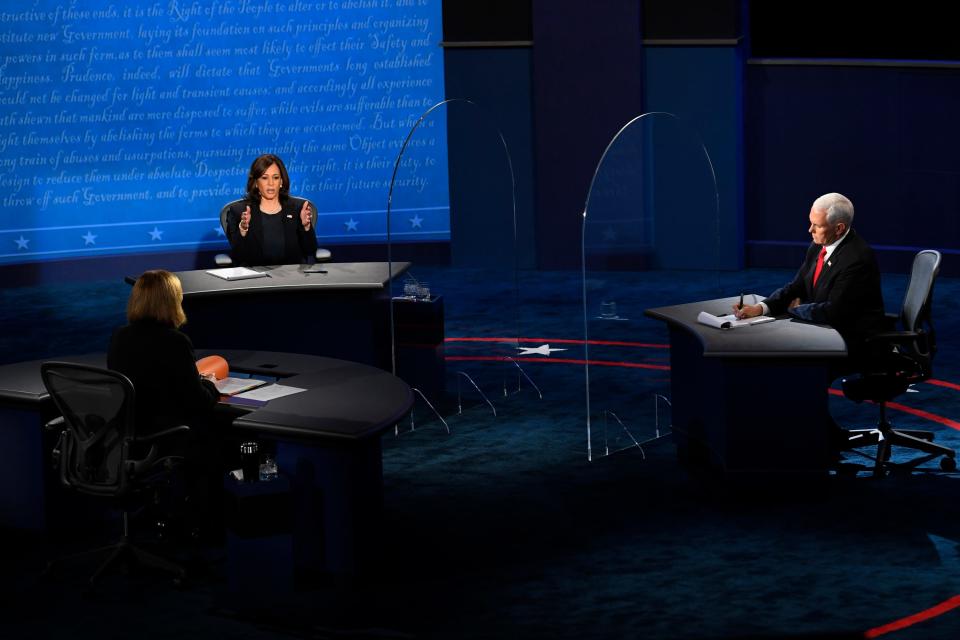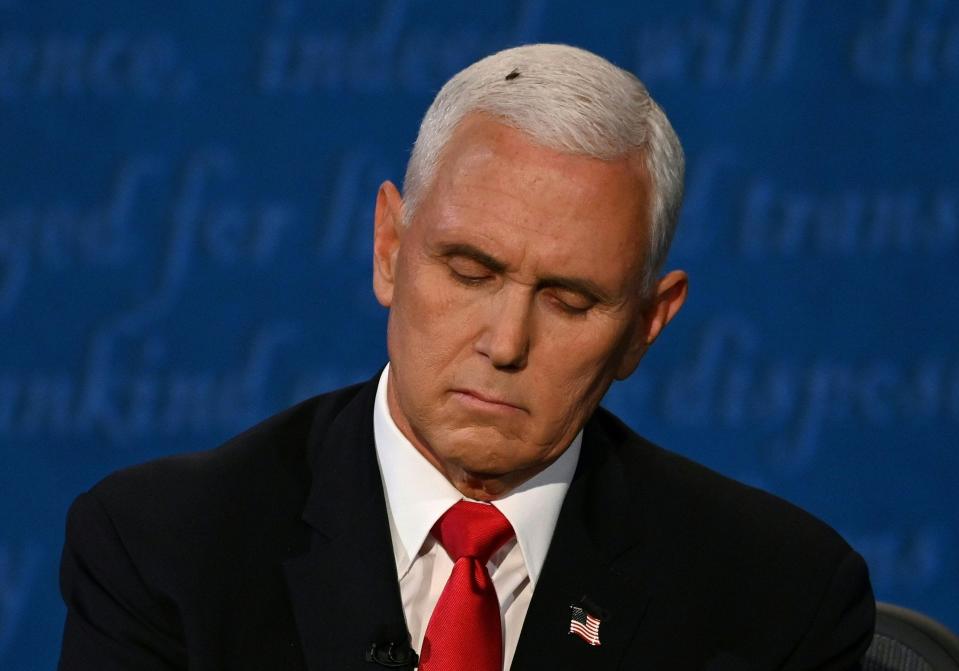Kamala Harris has some debate moves. I know. I moderated her last one.
WASHINGTON – Donald Trump seemed so confident he'd rout Kamala Harris in a televised debate that last month he proposed holding three of them.
We'll find out Tuesday if he was right.
In the vice-presidential debate on Oct. 7, 2020, facing off against Mike Pence, Harris held her own. She displayed her command as a prosecutor in demanding that Pence stop interrupting her, potentially useful practice when Trump is her opponent on the debate stage. She showed the discipline to stick to her talking points even when, or maybe especially when, she was dodging the actual question that had been asked.
I know. I was the moderator for Harris' last turn on the debate stage.
Sponsored by the Commission on Presidential Debates, it was held in Salt Lake City before an audience that generally heeded my entreaties beforehand to stay out of the way, to avoid cheering or booing until it was over.
This time, ABC News is sponsoring Tuesday's debate between Trump and Harris, with anchors David Muir and Linsey Davis as moderators.
When Trump and President Joe Biden debated in June on CNN, Biden's performance was so faltering that the ensuing furor led him to withdraw from the 2024 election altogether. That may have fed Trump's confidence about prevailing in debates.
Now Trump is comparing Harris unfavorably even with the president. "She's actually not as smart as he is," he said in early August during a news conference at Mar-a-Lago, expressing his eagerness to debate by accepting invitations from Fox News and NBC, too. "I don't think he's very smart either, by the way."
During some of the Democratic primary debates in the 2020 election cycle, Harris didn't seem certain what she thought about Medicare-for-all and other big issues ? stumbles that contributed to the departure of the California senator from the nominating contest even before the Iowa caucuses had been held.
Since becoming her party's presumptive presidential nominee this time, though, Harris has been sharper and more energetic at campaign rallies than Biden, with an ability to needle Trump with humor. ("I know his type," she says in an oft-repeated riff that resonates with her crowds.)
Debates demand different skills than rallies, of course, which typically follow a script and often use teleprompters. Backstage before the 2020 debate, both Harris and Pence seemed wound pretty tight, and understandably so.
Here are some of my takeaways from what happened next.

'Mr. Vice President, I'm speaking'
While Pence had a reputation as a polite Hoosier who played by the rules, for the vice-presidential debate he seemed to have taken lessons from Trump. He bulldozed past the time limits that had been agreed to beforehand by the two campaigns and repeatedly interrupted Harris.
Or tried to.
"Mr. Vice President, I'm speaking," she said at the nine-minute mark when he interrupted her answer about the Trump administration's response to the COVID-19 crisis.
"Well, I have to weigh in ? " he began.
"I'm speaking," she repeated with more force. It was an effective and presumably preplanned tactic. The "Mr. Vice President" honorific made her sound respectful. The "I'm speaking" follow-up made him risk seeming disrespectful if he continued talking.
The ground rules are different this time, with the candidates' microphones muted when they aren't supposed to be speaking. Still, a similar standoff might do more to unnerve Trump, who has struggled to find the comfortable footing in challenging Harris that he had shown against Biden. Among other things, Trump drew criticism for questioning Harris' racial identity before an audience of Black journalists.
In the 2020 debate, Pence interjected comments again at the 30-minute mark, when Harris was talking about taxes.
"Mr. Vice President, I'm speaking," she said.
"Well ?" he began.
"I'm speaking," she repeated, with a don't-test-me glare in his direction.
"It'd be important if you said the truth," he replied, sparking a word-salad of mutual protests over what, exactly, Biden would do about taxes if elected.
"If you don't mind letting me finish ..." Harris finally said.
"Please," Pence replied with a sarcastic edge.
"We can then have a conversation," she finished.
Finally, Pence tried again at the 65-minute mark as she was about to answer a question about the Supreme Court.
"Mr. Vice President, I'm speaking," she said. "I'm speaking."
Pence finally stopped speaking out of turn. It's just possible she was more successful than I was in enforcing that rule.
The discipline of the dodge
The value of debates is their spontaneity, their ability to force candidates to address issues they choose to avoid in the campaign events they control.
That spontaneity is also the danger for the candidates.
Hence, the debate dodge.
I asked Harris four years ago if she had discussed with Biden "safeguards or procedures when it comes to the issue of presidential disability," given his age. Did she think she should?
"So let me tell you first of all, on the call from Joe Biden, it was actually a Zoom call, asking me to serve with him on this ticket was probably one of the most memorable, memorable days in my life," she began, then filled her two-minute time period with a tribute to Biden's willingness to choose a groundbreaking running mate and a fond reminisce about her mother.
She "came to the United States at the age of 19, gave birth to me at the age of 25 at Kaiser Hospital in Oakland, California," she said, though it was Biden's date of birth that would have been more relevant. Biden was 77 at the time of the Harris-Pence debate, while Trump was 74 and just days removed from a COVID-19 diagnosis.
By the way, when I asked Pence the same question, he went even further afield, touting instead the record-setting development of a COVID vaccine by the Trump administration.
At the time, the Supreme Court was considering the case challenging Roe v. Wade. If the high court did eliminate the access to abortion enshrined in that decision ? as it later did ? I asked Harris if she would want her home state of California to enact abortion rights with no restrictions.
"I will always fight for a woman's right to make a decision about her own body," she replied after some warm-up words, never addressing whether she would back any restrictions. Then she attacked the Republicans for trying to repeal the Affordable Care Act, a separate issue entirely.
Remember the fly?
The plexiglass barriers between Pence and Harris, designed as protection during the pandemic, looked a little peculiar on stage.
But nothing was stranger than the fly that somehow breached security, flew into the middle of the University of Utah stage and landed on Pence's head, where it took up residence for a time. The vice president's silvery white hair made it hard to miss ? at least for the millions of viewers watching on television.

Not to me. I couldn't see it. Pence didn't know it was there, either, he told me afterwards. I heard that Harris could see it but decided against mentioning it. After all, what exactly could she have said? "Mr. Vice President, there's a fly on your head"?
That was not an issue strategists had presumably discussed during debate prep, so her restraint showed good judgment on the fly. So to speak.
And the winner was. . .
When the debate ended and the TV cameras stopped, both candidates looked as though they were more relieved that they had survived than confident they had won. As arranged beforehand, Pence exited stage right and Harris stage left, where family members were waiting.
That was pretty much what the polls afterwards indicated. Harris had a good night, but Pence didn't have a bad one ? and neither performance had a meaningful impact on the outcome of the election.
An Ipsos poll of respondents taken before and again afterwards showed Harris improved her favorability ratings a bit, to 51% from 45%, while Pence's favorability edged up a whisker, to 39% from 37%. A CNN poll found by 59%-38% respondents said Harris did a better job than Pence.
But the head-to-head presidential race in the Ipsos poll didn't budge, and a majority in the CNN poll said the debate had no effect on their vote.
That's not surprising, given that it was a debate between the vice-presidential contenders.
The stakes will be higher, and the impact almost certainly greater, with the debate this time between the candidates at the top of the ticket.
Susan Page is the Washington Bureau chief of USA TODAY.
This article originally appeared on USA TODAY: Trump thinks he'll dominate Harris in debates. But she has moves.
